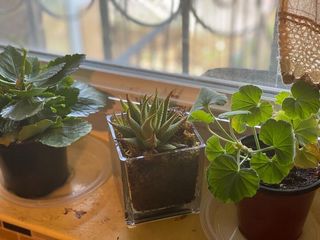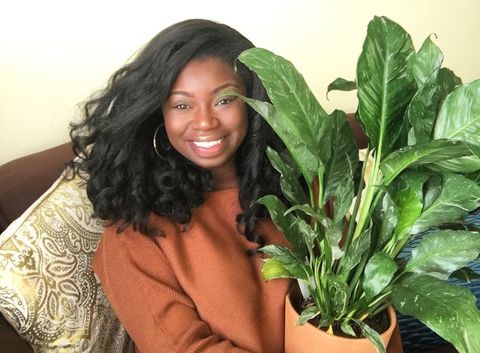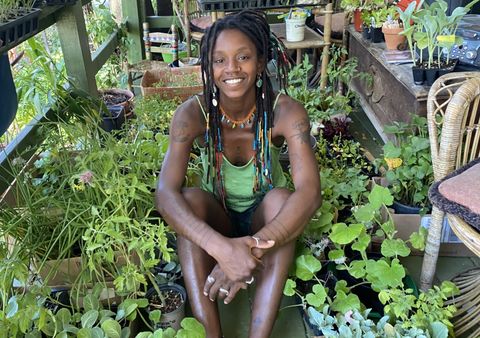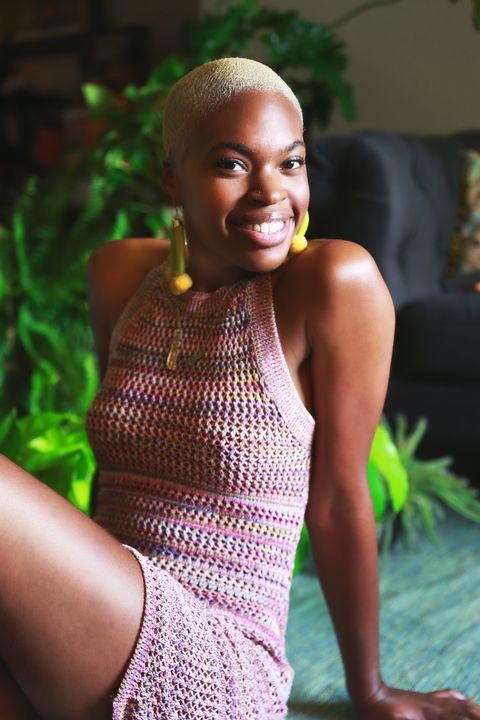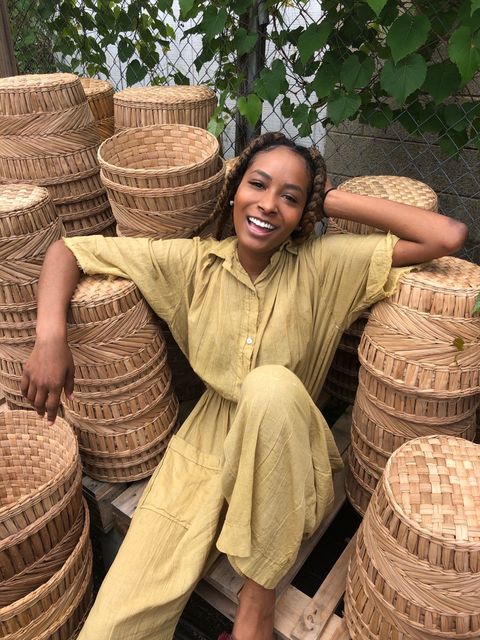To be Black in America right now is to bear the brunt of all of the world’s current crises at once: a global outbreak that is disproportionately affecting Black communities, racial tension and police brutality, and gun violence—just to name a few. To be Black in America is to live in a perpetual cycle of fear, anxiety, anger, and sometimes momentary happiness, before that sliver of joy is eclipsed by yet another wave of anger. I cope by revisiting a classic Black sitcom—this month it’s A Different World—for a respite from the overwhelming sense of anxiety. But in seeing Denise, Whitley, Dwayne, and Jalessa revel in their blackness at the fictional HBCU Hillman College on screen, I’m reminded that it’s just not that easy for Black people in the real world to do the same, especially when we are being slain by cops and harassed by white supremacists in daily life. “Arrest the cops who killed Breonna Taylor” has become a frequent refrain on social media.
On the street, Black people are channeling these anxieties and fears into protests nationwide to demand justice for the tragic deaths of Taylor, George Floyd, Ahmaud Arbery, Tony McDade, and more. At home, there’s another movement sprouting up, one that aims to quell unrest: plant parenting.
On the surface, becoming a “plant mom” was a passion project for me. At the beginning of the pandemic, my betta fish Rue passed away, confirming that caring for any kind of animal wasn’t my calling. Caring for houseplants seemed like an easier path for me to embark on: they’re aesthetically pleasing—you’d be hard pressed not to find an Instagram post or YouTube video with a bright green monstera sitting pretty in the background—require little maintenance, and add a sense of calm to any space. But quickly it became a distraction from seeing countless Black lives turned into hashtags, brands posting messages of solidarity with the Black community on social media but failing to diversify their boardrooms, and helplessly watching an incompetent leader mishandle the coronavirus outbreak as cases surge each day. Researching how much light a pathos plant needs or what Etsy shops could safely deliver a Chinese evergreen to my front door quickly replaced my usual hours-long scroll through triggering headlines and tweets. Then, I found Black Girls With Gardens, an Instagram dedicated to infiltrating the white-washed plant community with images of Black women gardening and planting.
“I launched Black Girls with Garden in 2017 to find other individuals, other black women, to discuss plant care from our perspective,” Jasmine Jefferson, a full-time therapist and founder of Black Girls with Gardens, told ELLE.com from her home in Florida. “As a Black woman who loves plants, I felt isolated, kind of embarrassed, to even talk about it because I was so interested in something that I felt like I didn’t belong [to].” Jefferson introduced Black Girls with Gardens with four pillars that encourage more Black women to explore their green thumb: provide education, support, inspiration and representation.
I quickly fell down a rabbit hole of the Black planting community and found more images of Black people gardening and growing plants. Nkoula Badila, a singer/songwriter of cosmic soul band Lady Moon, launched Grow Black Hudson this year on Juneteenth, after becoming increasingly frustrated with the lack of support of the Black community in Hudson, New York, which barely has any Black-owned businesses. In the weeks following George Floyd’s death, the city of Hudson held a rally in support of the Black Lives Matter movement, but “they don’t acknowledge the actual Black lives that matter in this town, that are getting neglected every day,” Badila said.
When Briana Holder introduced Ear Gardn in 2019, she shared a similar mission: to encourage Black people to build a sanctuary that feels safe and filled with love to return to after a long day of facing a cruel, unforgiving world. For Raven Davis of Hot Plant Mom, who launched her platform in March of this year, plant parenting helped improve her mental health. “I’ve suffered from depression and there was no way I could be stuck in this apartment for God knows how long with no plans,” Davis said. “For me, having little projects for myself helped me stay occupied and helps me look forward to things.”
Plant parenting means different things to different people, and as our Instagram timelines brim with new plant parents, it made me wonder: Why are so many Black people buying plants all of a sudden? Ahead, Jefferson, Badila, Holder, and Davis share why buying plants is worth it.
Jasmine Jefferson, Black Girls with Gardens
“Right now, Black people feel defeated. We’re fighting so many different battles and just want to feel balanced, to be valued. Plant caring helps you to feel grounded; it’s rewarding to care for plants because you’re watching the fruits of your labor. The current climate is taking a toll on our mental health—depression, anxiety, etc.—and caring for a plant allows you to sit and rest. It allows your brain to not have to think about the who, what, where, why and when.
I have an issue with meditating. I start thinking about all the things I have to do. As a therapist, I deal with mentally ill patients. I see where Black people are misdiagnosed with certain mental health or if they’re not even diagnosed at all because they’re considered criminals and things like that. I see that daily and it can take a toll on me. But when I’m watering my plants in my garden, I can sit there mindlessly and just pour. Plants add value to our lives and lets us know that we mean something, that we’re capable of caring for things. As plants grow, we grow. Having a garden, knowing that I can grow my own food, and I can make something grow, balances all of that chaos for me.
This content is imported from Instagram. You may be able to find the same content in another format, or you may be able to find more information, at their web site.
It’s also inspiring to see Black representation in an area that has ignored us. It’s motivating, really. Seeing Black women garden lets you know that, ‘Okay, I belong,’ and encourages you to learn more. This current climate has forced people to realize that even though their day-to-day hobbies have been severed, planting is just as rewarding because it makes you feel about yourself. The Black planting community is family, it’s where I can discuss plants and gardening with people who might not have other people to talk to or get tips from.”
Favorite Plant: Nepenthes Miranda – “It teaches you patience because it requires a lot of water and attention.”
Favorite Shop: Tennesse Tropicals, tennesseetropicals.com
Nkoula Badila, Grow Black Hudson
“When I launched Grow Black Hudson, it was really important for me to make sure that Black people were represented and that we are continuing to represent ourselves in a town and in a world that doesn’t acknowledge our talents and our skills and our presence and our energy that’s building up this nation to be what it is. Plants brings us back to our ancestors. Plants are healing. Plants are medicine. Being in the time of isolation with COVID-19, plants bring life into your space because we’re not going outside as much or seeing enough green and we need that energy from nature. Just being with the soil and seeing how you are planting the seeds or planting a plant, opening up the roots and being a part of something’s growth and success is healing. You’re caring for life and connecting with the earth and understanding the chemistry of the soil, the rain, the sun, the chlorophyll, and gaining a deeper knowledge of how life works.
This content is imported from Instagram. You may be able to find the same content in another format, or you may be able to find more information, at their web site.
A good mental health tip is to name your plant after yourself so that when you’re talking to it and when you’re pouring into it, you’re literally talking to yourself. You’re giving yourself a self-affirmation as well as putting that energy into the plant. Especially if you’re conscious about how you love for yourself, then you’ll know that what you’re giving the plant is real love and the plant is going to feel that. It’s going to thrive and it’s going to feel like, ‘Yeah. I want to grow as well because I feel that energy of this person wanting to heal and wanting to grow.'”
Favorite Plant: Aloe – “Aloe are good to have because you can use it for any kind of burns, scrapes, and rashes. Aloe always cures it all. Plants like that that are medicine.”
Favorite Shop: Soul Fire Farm, soulfirefarm.org
Briana Holder, Ear Gardn
“I think part of it is because a lot of people are starting to see themselves more in the community. When I was starting Ear Gardn, there were not that many of us on Instagram. I feel like now a lot of black women and men can see themselves in other people who have plants because if you open up any home and garden magazine, you’re going to see a 60 year old white woman in a southern home with a white picket fence or a young white woman in a beautiful apartment in New York with all these expensive plants. Ain’t nobody trying to see that. I want to see myself. I want to see a regular black person that’s my age with plants. I’m not trying to see someone who has access and they hired a plant stylist. I want to see just regular everyday people with plants. I feel like a lot of people are posting about it for aesthetics but there’s a lot of knowledge people can learn about the plants in their homes.
This content is imported from Instagram. You may be able to find the same content in another format, or you may be able to find more information, at their web site.
I thought I didn’t have a passion until plants came into my life—they’re really my life. Outside of taking care of them, you can also teach people about plants and develop a community around it. Nature is healing and. having them in your space brings a sense of peace to the point where I started bringing plants to parties and made a career out of it. Then I feel like caring for them, watching something grow, boosts your confidence; it brings you happiness. You’re watching something grow. That’s going to make anybody feel happy. That’s how you should feel every time you walk in your house—happy.”
Favorite Plant: Snake Plant – “Snack plants are super tolerant; they are accessible, they’re beautiful, and they come in so many different varieties. Plus, snake plants are the type of plants you can forget about and they’re going to be thriving no matter what.”
Favorite Shop: Plant Nerds, plantnerdsatl.com
Raven Davis, Hot Plant Mom
“With planting, you’re watching the results of your nurturing—it’s a direct result of your actions. In today’s climate, there’s so much that’s unknown. Who knows what we’re going to wake up to tomorrow or Trump has done? With my plants, you know exactly what’s happening because what you put in is what you get, it’s a direct result of your hard work and your dedication.
Once you buy one plant, you’re going to want to buy more because it’ll turn into a challenge to learn about the plants that you’re buying, how to keep it alive, how to make it more healthy. It’s easy to get into the aesthetic of it but then you learn about propagating. You’re telling me I can cut a piece off my plant for and make a whole other plant?
This content is imported from Instagram. You may be able to find the same content in another format, or you may be able to find more information, at their web site.
Also, plants bring positivity to your life. Plants provide extra oxygen, so they’re living things that you have to take care of or they will die, so it makes you more inclined to get up and take care of them and nurture them. It keeps you occupied and helps a lot with anxiety. When I go through my plants, it gives me a second to breathe. My plant time is a my moment to focus on just that so in a way, it’s a form of meditation.”
Favorite Plant: Pathos – “Pathos plants are affordable, I wouldn’t spend more than $20.”
Favorite Shop: Natty Garden, nattygarden.com
This content is created and maintained by a third party, and imported onto this page to help users provide their email addresses. You may be able to find more information about this and similar content at piano.io

